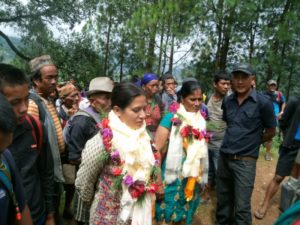This post was originally published by Empower Generation, which merged with Pollinate Energy to form Pollinate Group in 2018.
Immediately after the 2015 earthquake in Nepal, Empower Generation set out to donate lights to affected communities in rural areas, as part of Project Sol. Every time our staff members travel to remote communities to distribute solar lights, it is evident that the work they do is important. Sometimes, however, one distribution stands out more than the others and leaves a deep impression on them for weeks to come.
Our Program Coordinator Chanchala Dhakal had one of these memorable distributions in Nuwakot District. Here she shares her experience:
Our team went to the district office in Nuwakot for a permission letter to distribute solar lights. The Energy Officer told us there were only two areas in this district, which were off grid, and we should donate to these areas. The officer questioned our capability, since we were women and the areas were difficult to access. We wanted to donate to people who were facing an energy crisis, so we persisted, despite the Energy Officer’s attempt to dissuade us. After discussing our solar light distribution program, we got the permission to do the delivery in Urleni’s two wards where there are 345 households. The social leaders in these areas advised us to finish our distribution no later than 3 PM; since after 3 PM, the people in these communities start to drink, a ritual that is part of their daily life, and which could prove dangerous for us, a team of women. Our distribution team consisted of three women: our entrepreneurs Manju Paudel of Manju Solar Enterprise from Nuwakot and Kala Khatiwada of Pragati Saurya Urjah from Dhading, and myself. It was my responsibility to ensure that the distribution was a success.
We provided our plan to the Village Development Committee’s (VDC) office, and we asked for help from the police force for protection during the distribution, which was far from the district head office in Nuwakot. Police protection was necessary because after the earthquake, people were in crisis. Looters raided distribution deliveries on route and waiting crowds could become unruly. Our support group and social leader partners advised us to organize our donation program close to the police camp near Kharanitar VDC, on the way to Urleni.
We requested that only the off grid areas’ households should present themselves for the donation, and we asked for a list of names of the heads of these families. The area is undeveloped, and people have little access to education. Many members of the community are forced to go abroad to earn money, so that they can feed their families.
To get to the solar light distribution point, community members had to walk four to six hours. There were over 400 people waiting for us when we arrived. They were happy and welcomed us by putting flower garlands around our necks and painting tikas on our foreheads (a traditional way of greeting in Nepal). They also thanked us for bringing what they needed badly—solar lights. All of them were emotionally touched.
Chanchala speaks to community members:
It was a hot day and while our necks were heavy with garlands, we did not feel any pain or discomfort. We were only thinking that we had come to the right place for our distribution. With our help, 345 households have reliable light and mobile phone chargers. Before our distribution, most of the community members had to go to another village to charge their mobile phones. Now, they can call their family and friends from their own village. People told us that our distribution was the most useful and valuable donation to their community. They thanked Empower Generation and our whole team.
It was not easy to distribute 345 lights one by one in a short period of time. The social leaders, the police force, and our team—we all worked hard without eating all day. The people in the community were worried about us and told us to drink a lot of water because it was so hot, and many of them tried to shield us from the sun. In the end, we were all sweaty from the heat, but we were happy that we completed our work and that we were also able to distribute seven d.light D20 solar lights, donated by Solar City, to the local school.
We want to thank everyone who helped us with the distribution in Nuwakot—the local police force, the secretary of the VDC, and the community’s social leaders.
This story shows how badly remote communities are in need of solar lights and how grateful they are for the work we do. It also demonstrates some of the challenges staff members face while doing their job.
In the future, we hope to help many more remote, off grid communities in Nepal, just like the one we helped in Nuwakot.

